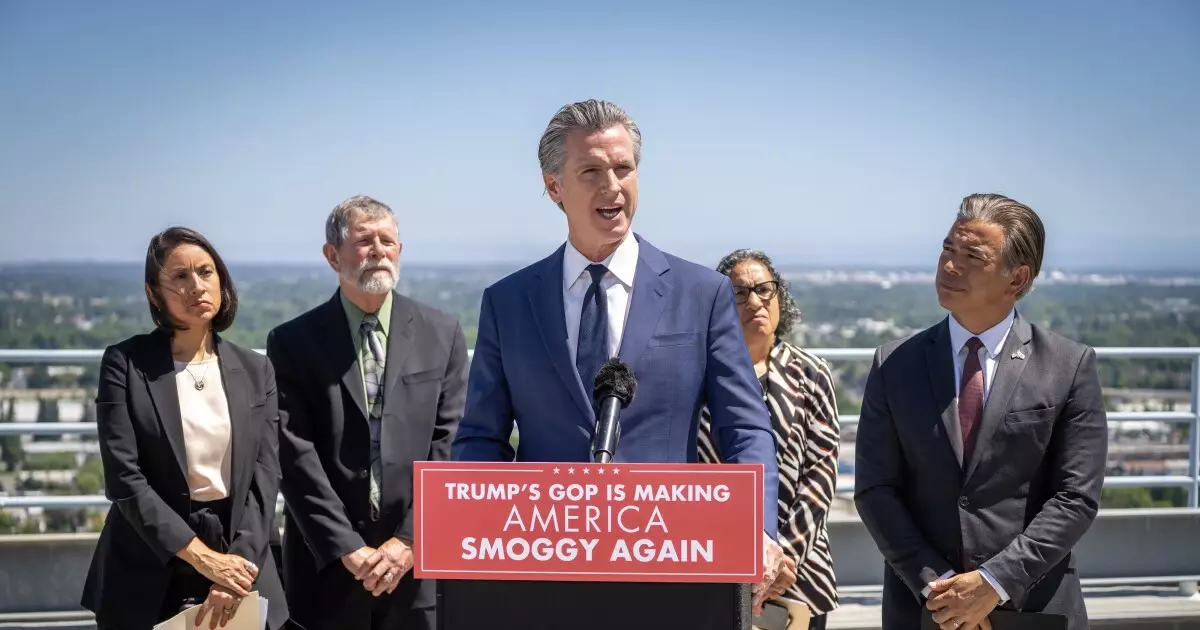In an era where climate change and environmental sustainability are at the forefront of global discourse, the state of California has once again found itself embroiled in a fierce battle against the federal government. The Trump administration’s potential repeal of California’s vehicle emission regulations stands as a testament to the widening chasm between state rights and federal oversight. As California prepares to file its 23rd lawsuit against the Trump administration, we witness a significant clash not just over environmental policy, but also over economic implications and public health.
The specifics of this legal skirmish revolve around a bill that seeks to dismantle California’s strict vehicle emissions standards, which aim to phase out fossil fuel vehicles. This represents more than just another skirmish over regulations; it is an existential fight for a state that prides itself on its progressive stance towards environmental legislation and innovative technologies. Governor Gavin Newsom’s 2020 executive order is not an arbitrary directive. It reflects decades of effort to combat air pollution and climate change and to move towards renewable energy sources. Simply put, the impending federal action feels like a calculated ambush on California’s legislative autonomy.
Historical Bipartisanship Gone Awry
Historically, the quest for cleaner air in California has transcended partisan politics. Newsom himself pointed out that even Republican leaders like Ronald Reagan and Richard Nixon supported stringent air quality measures during their tenures. The current administration’s approach seems to not only disregard this bipartisan legacy but also to regress to an era of environmental neglect. Indeed, the Trump administration’s tactics embody a jarring shift towards prioritizing short-term political gains over long-term sustainability objectives.
Notably, the implications of losing California’s emission waivers extend beyond state lines, affecting national policies and the future of electric vehicle (EV) integration. The California Air Resources Board (CARB) has consistently set standards that lead the nation and the world, thus positioning California as a beacon of innovation in clean air standards and electric vehicle adoption. Such regulations have encouraged not just a cleaner environment, but have also fostered a growing economy around sustainable technology—an area where California has consistently outpaced its rivals.
Public Health at Stake
The ramifications of this legislation go far beyond political grandstanding; they pose dire threats to public health. As one of the states with the worst air quality, millions of Californians deal with the daily consequences of air pollution. This is not merely an environmental issue; it is an urgent public health crisis that exacerbates ailments such as asthma and cardiopulmonary diseases. Public servants like Liane Randolph, chair of CARB, emphasize that the health of millions hangs in the balance, especially in regions like the San Joaquin Valley and Los Angeles, where air quality remains perilously poor.
In an environment taut with anxiety over health and pollution, the refusal to uphold stringent emission standards appears not merely reckless but dangerously shortsighted. The numbers speak for themselves: greenhouse gas emissions in California have already dropped by 20% since the early 2000s. If the Trump administration has its way, the rollback of these standards could induce a spike in emissions and a corresponding decline in public health. This is a worrying prospect as it undermines years of progress and regulatory achievements.
The Economic Future and Technological Leadership
Yet, the stakes are not just ecological or public health-oriented; they also extend into the economic realm. By dismantling California’s innovative regulations, the Trump administration is essentially ceding leadership in the burgeoning electric vehicle sector to countries like China—a fact that would undoubtedly compromise America’s competitive edge. Newsom’s criticism of the motivations behind this legislation touches on crucial points: is there a deeper strategy to relive the U.S. economy through fossil fuel dependency while ignoring the shifting technological landscape?
The Biden administration’s commitment to fostering clean energy and electric vehicles contrasts sharply with a regressive push from certain members of Congress. By undermining California’s efforts, the federal government would push the nation toward a smoggy past while sacrificing opportunities for economic growth and technological advancements in clean energy. Ultimately, California’s fight is about preserving an economic landscape that champions innovation, sustainability, and health—a fundamental right for its citizens that should not be negotiable.

